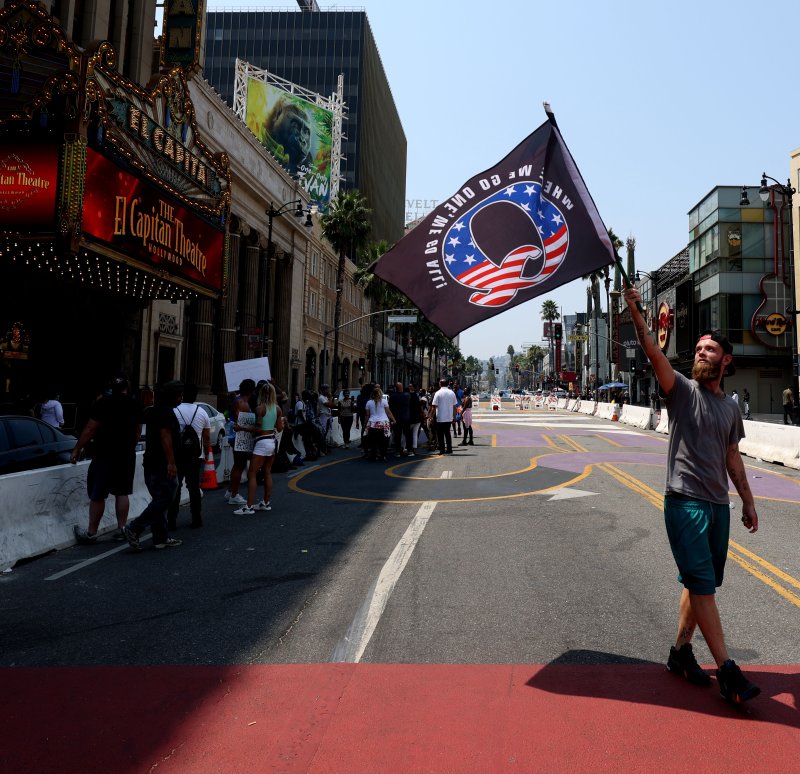A man holds a QAnon conspiracy flag while walking over the All Black Lives Matter mural in Hollywood, Calif., on August 22. The QAnon conspiracy, without evidence, accuses Hollywood actors of engaging in crimes against children. File Photo by Christian Monterrosa/EPA-EFE
Oct. 15 (UPI) -- Experts testified before Congress Thursday that the spread of misinformation and conspiracy theories online has contributed to the "dismantling of democracy" as well as real-world violence.
During the House intelligence committee hearing, titled "Misinformation, Conspiracy Theories, and 'Infodemics': Stopping the Spread Online," the panel explored the role social media platforms play in spreading such content, how foreign and domestic take advantage of misinformation online and what steps the U.S. government and private sector should take in response.
"This is a threat that is dismantling democracy, as Americans right now exercise their democratic rights it is critical the nation is informed about how disinformation might blunt their voice and their vote," said Wilson Center disinformation fellow Nina Jankowicz.
The panel, which Republican members of the committee declined to participate in, specifically expressed concern for exploring misinformation and conspiracy beliefs on social media and elsewhere on the Internet amid the COVID-19 pandemic and the nearing Nov. 3 election.
Following evidence of Russian interference in the 2016 presidential election, in part through various online misinformation campaigns, Cindy Otis, vice president of the Alethea Group, warned that more countries have adopted similar tactics.
"Perhaps inspired by Russian efforts, more countries than ever are using false information to advance both their domestic and foreign policy goals such as China and Iran," Otis said. "Many of these foreign actors are actively targeting political divisions in this country to manipulate and influence American citizens and to degrade America's standing in the world and the credibility of our institutions."
Jankowicz further warned that lawmakers and social media heads have also failed to stem misinformation spread by domestic actors.
"Not only have the U.S. government and social media platforms all but abdicated their responsibility to stop the threat of foreign disinformation, domestic disinformation now runs rampant," she said. "It is amplified in the media, online, in the halls of Congress and from the White House itself. It does our adversaries work for them, leaving us vulnerable to continued manipulation and leaving our democracy imperiled."
Thursday's hearing came as YouTube followed recent actions by Facebook and Twitter to ban content from the conspiracy group QAnon, as well as broadening its hate and harassment policies to prohibit content featuring conspiracy theories that have been used to justify real-world violence.
The House also voted earlier this month to condemn QAnon, a conspiracy theory that claims the world elites maintain a "Satanic child-murdering sex cult," that President Donald Trump is working to bring to justice.
Melanie Smith, head of analysis at Graphika Inc., identified QAnon as "the most pressing threat to trust in government, public institutions and democratic processes."
"The real reason QAnon poses a threat is in its systematic undermining of facts and truths on topics of genuine concern, such as the integrity of elections, human trafficking and the global COVID-19 pandemic," she said.
Smith also sought to dispel a pair of misconceptions about QAnon including that it had been stoked or infiltrated by foreign actors and driven by bots or fake accounts, saying that it in reality "does appear to be a homegrown movement that engages real users."
Trump himself has been flagged by both Facebook and Twitter in recent months for spreading misinformation, including a claim last weekend that he's now "immune" from COVID-19.
Trump spent several days in the hospital and under constant medical observation and took multiple drugs, including at least one that's not yet been approved by federal regulators, after he was diagnosed with the coronavirus disease.
The panel called on social media platforms and the government to take greater steps to prevent the spread of conspiracy theories and misinformation online.
"The leading social media platforms have all made significant changes in their policies and capabilities since 2016, but they have not changed the foundational features of their platforms that expose users and even recommend to them often extreme sensational or emotionally charged content," said Rep. Adam Schiff, D-Calif.
Dr. Joan Donovan, research director on at the Shorenstein Center on Media, Politics, and Public Policy at Harvard Kennedy School said she is "very much in favor" of establishing a new agency to regulate the impact of social media regulation and provide recommendations on how to do so.
"Rather than hold on to techno-nostalgia for a time when social media was not this harmful, sometimes its worth asking: 'What would it take to uninvent social media?' so that we can chart a course for the web we want. A web that promotes safety, equity and democracy," she said.















